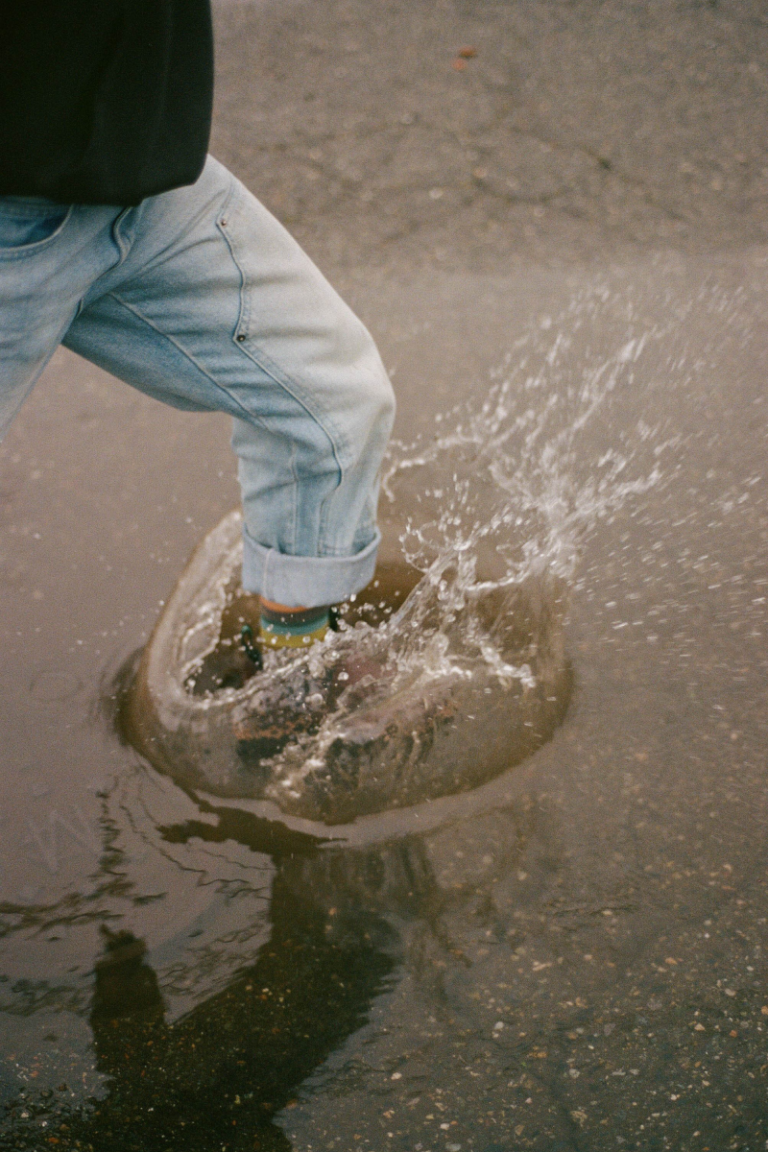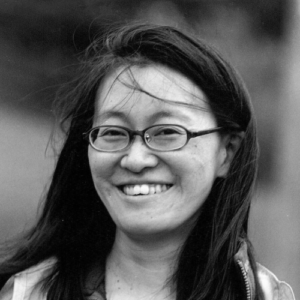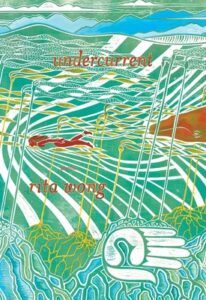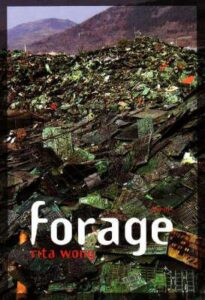Rita Wong
flush
The word “flush” is a verb, as in an activity that we do umpteen times a day. It’s also an adjective that conveys abundance. Fittingly, Rita Wong’s poem “flush” offers a praise song to water’s expansive and unceasing presence in our lives — from our toilets to our teacups, from inside our bodies to outside our buildings, and from our soil to our skies.
We’re pleased to offer Rita Wong’s poem, and invite you to read Pádraig’s weekly Poetry Unbound Substack, read the Poetry Unbound book, or listen back to all our episodes.

Image by Annisa Hale/ Film processed by Moody's Film Lab, © All Rights Reserved.
Guest

Rita Wong is the author of several poetry collections, including monkeypuzzle (Press Gang, 1998), forage (Nightwood Editions, 2007), and undercurrent (Nightwood Editions, 2015). Wong is an associate professor at the Emily Carr University of Art + Design.
Transcript
Transcription by Alletta Cooper
Pádraig Ó Tuama: My name is Pádraig Ó Tuama, and years ago I read a book written by a Swiss-French monk who said that he was walking into a house one day and it was pouring with rain, and as he walked in, somebody was standing on the porch and looked at him and said, “Terrible weather.” And then he stood on the porch and looked out and he saw a frog, and he was thinking about how the frog seemed to be quite happy hopping around. I like walking in the rain. Maybe I’m part frog, but I think the monk’s point was something different, which was about the necessity of rain. That rain isn’t an interruption to our life, but perhaps the very source of it.
[music: “Praise the Rain” by Gautam Srikishan]
“flush” by Rita Wong
“awaken to the gently unstoppable rush of rain landing on roofs,
pavement, trees, porches, cars, balconies, yards, windows, doors,
pedestrians, bridges, beaches, mountains, the patter of millions
of small drops making contact everywhere, enveloping the city
in a sheen of wet life, multiple gifts from the clouds, pooled
over centuries and channelled to power us, rain propels our
water-based bodies that eat other water-based bodies, mineral
vegetable animal. when i turn on the shower, i turn my face and
shoulders toward post-chlorinated rain. the tap releases free rain
to slake our thirst, transformed through pipes and reservoirs.
anonymous agent of all that we, unwitting beneficiaries, do.
refusing the inertia of amnesia, i welcome the memory of rain
sliding into sink and teacup, throat and bladder, tub and toilet.
bountiful abundant carrier of what everyone emits into the
clouds, be that exhale or smoke, belch or chemical combustion,
flame or fragrance, the rain gives it all back to us in spates, a
familiar sound, an increasingly mysterious substance”
[music: “Into the Earth” by Gautam Srikishan]
So this poem of Rita Wong’s, “flush,” is a praise song to rain in many ways. It begins with the word “awaken” and talks about how the rain is active before the speaker is. And then the poem continues with this glorious list of “trees, porches, cars, balconies,” and it goes on. It goes from the very particular in one small place cascading outwards and upwards and backwards and forwards in time. It’s gentle and unstoppable, the rain is, and it makes contact everywhere, and it envelops. Suddenly what is present just outside your window becomes a constant presence in time and space.
In a poem that is so much about rain and flush and the sound of water, the body is mentioned over and over. There’s pedestrians and reference to making contact and “our / water-based bodies that eat other water-based bodies.” “When I turn on the shower,” and then there’s “face and / shoulders” and “slake our thirst,” so thinking about the thirst of the body or the feeling of water as you drink. The memory of rain in teacup and throat, and then “bladder, tub, and toilet.” It’s a brilliant thing and a relatively unusual thing for a poem to mention the need to pee, the exhalations or belches of the body. In Rita Wong’s ecology of the landscape of this poem, all of this is part of natural life, and all of this is brought into conversation with the experience of being water in conversation with the water of other bodies, and in conversation with the question about how is water going to continue.
This poem is talking about a phenomenon, rain, where it starts or stops, but then, in many ways, says that we’re the phenomenon and that rain is the constant and the question is how attuned are attuned or we to the water-based basis of all of life.
[music: “Daybreak” by Gautam Srikishan]
Another way of taking the word “awaken” is to wake up to the reality of water, to the reality of the necessity and the politics of water accessibility. The rain in this poem gives itself over and over and over, kindly, generously, abundantly everywhere, not just to everyone, but to everything and everyone. Rita Wong is profoundly alert to the democracy in the characterization of rain in this poem. There’s a line “refusing the inertia of amnesia, i welcome the memory of rain.” And you could write an essay about so many of the major words just in this short sentence: “refusing” strong word, and the “inertia,” the unwillingness to take action and then “of amnesia.” I take it to mean that she’s inferring a certain chosen forgetfulness. So refusing not to take action, refusing to choose to forget. She says, “i welcome the memory of rain.” An active verb. “i welcome.” And then, I wonder, what is the memory of rain? What does rain remember? What is it that it members in me? In all ways, the ways within which water is us, and we are water is praised throughout the poem. But what’s so interesting is towards the end, when there’s this definition of “an increasingly mysterious substance,” I find myself wondering what that could be. Mysterious, perhaps, in the recognition of water being a source of life. But mysterious in another way, too, perhaps in a warning way, that the water that falls back down on us sometimes reflects us.
I remember as a child hearing so much about acid rain. Acid rain can sometimes be caused by volcanic eruption, but also from emissions from human industry, “an increasingly mysterious substance.” What does that mean? That it could be “increasingly mysterious?” Maybe it is increasing in the way that it’s reflecting us back to us, a mystery to ourselves as to why we are not responding to the absolute knowledge that we have about the necessity of water, clean water, accessible for all in our life. This poem is sounding a warning, an alert to us.
[music: “First Grief, First Air” by Gautam Srikishan]
The question of environmental responsibilities is of huge consequence in Rita Wong’s life. She was sentenced to 28 days in jail for taking part in a demonstration due to climate emergency. She released a statement where she said that she “acted with respect for the rule of law, which includes the rule of natural law and the rule of Indigenous law.” And she spoke in the statement about the responsibility to ancestors and ancestors of the land and to protect the salmon and the trees and the water, and a responsibility under law to hold leaders, politicians, accountable. Her approach to reframing the rule of law is to say, “What is the rule of law of nature when it comes to the abundance of water, to the necessity of water, to all living beings, whether they grow from the earth, or whether they live in apartment buildings?”
She is insistent on noting that we can all learn from natural law and Coast Salish law, also, that we have a “reciprocal relationship with the land.” And by land, I take it to mean the natural world of which we’re a part as human beings, and that we all have a responsibility to care for the land’s health, which is ultimately our health, too.
[music: “Ashed to Air” by Gautam Srikishan]
This poem, “flush,” is from a book by Rita Wong called Undercurrent, and some of the poems have a quote at the bottom of the page or an etching, my favorite is of a snail. There’s leaves or a plant. And the quotes that are at the bottom of some of the pages are arranged in these kind of wavy lines. It looks like the etchings and some of the quotes are the flowing of a river with things living by and near and in it the whole way throughout a book.
Thomas Merton is quoted at the bottom of this page. Thomas Merton was a Trappist monk, an American monk, who wrote about contemplation and art and Christianity as well as interreligious dialogue. And here’s the quote from Thomas Merton, that’s at the bottom of the page that holds “flush” in Rita Wong’s book: “the rain surrounded the cabin…with a whole world of meaning, of secrecy, of silence, of rumor. / Think of it: all that speech pouring down, selling nothing, judging nobody, drenching the thick mulch / of dead leaves, soaking the trees, filling the gullies and crannies of the wood with water, washing out / the places where men have stripped the hillside…Nobody started it, nobody is going to stop it. It will / talk as long as it wants, the rain. As long as it talks I am going to listen.”
I feel like the poem from Rita Wong is a response to this quote, or maybe she wrote it because she, too, was looking at the rain and then came across this quote and thought, “We both were being prompted by the same thing.” Who knows? The inspiration for art runs through the centuries in the same way that rain does. The way that he writes about rain and the quote that she uses personifies it with speech and says that the rain has no judgment and no marketing or discrimination and that it gets everywhere. “Nobody started it,” he says. I like the idea that nobody here is functioning as a word for God, and maybe nobody is God in the theology of this poem, but perhaps on a deeper level, rain is God because, without rain, there would be no life.
[music: “Daybreak” by Gautam Srikishan]
“flush” by Rita Wong
“awaken to the gently unstoppable rush of rain landing on roofs,
pavement, trees, porches, cars, balconies, yards, windows, doors,
pedestrians, bridges, beaches, mountains, the patter of millions
of small drops making contact everywhere, enveloping the city
in a sheen of wet life, multiple gifts from the clouds, pooled
over centuries and channelled to power us, rain propels our
water-based bodies that eat other water-based bodies, mineral
vegetable animal. when i turn on the shower, i turn my face and
shoulders toward post-chlorinated rain. the tap releases free rain
to slake our thirst, transformed through pipes and reservoirs.
anonymous agent of all that we, unwitting beneficiaries, do.
refusing the inertia of amnesia, i welcome the memory of rain
sliding into sink and teacup, throat and bladder, tub and toilet.
bountiful abundant carrier of what everyone emits into the
clouds, be that exhale or smoke, belch or chemical combustion,
flame or fragrance, the rain gives it all back to us in spates, a
familiar sound, an increasingly mysterious substance”
[music: “Praise the Rain” by Gautam Srikishan]
Chris Heagle: “flush” comes from Rita Wong’s book Undercurrent. Thank you to Nightwood Editions who gave us permission to use Rita’s poem. Read it on our website at onbeing.org.
[music: “Praise the Rain” by Gautam Srikishan]
Poetry Unbound is: Gautam Srikishan, Eddie Gonzalez, Lilian Vo, Lucas Johnson, Amy Chatelaine, Kayla Edwards, Annisa Hale, and me, Chris Heagle.
Our music is composed and provided by Gautam Srikishan and Blue Dot Sessions.
This podcast is produced by On Being Studios, which is located on Dakota land. Open your world to poetry with us by subscribing to our Substack newsletter. You may also enjoy Pádraig’s book, Poetry Unbound: Fifty Poems to Open Your World. For links and to find out more visit poetryunbound.org.
Books & Music
Recommended Reading
The On Being Project is an affiliate partner of Bookshop.org and Amazon.com. Any earnings we receive through these affiliate partnerships go into directly supporting The On Being Project.










Reflections